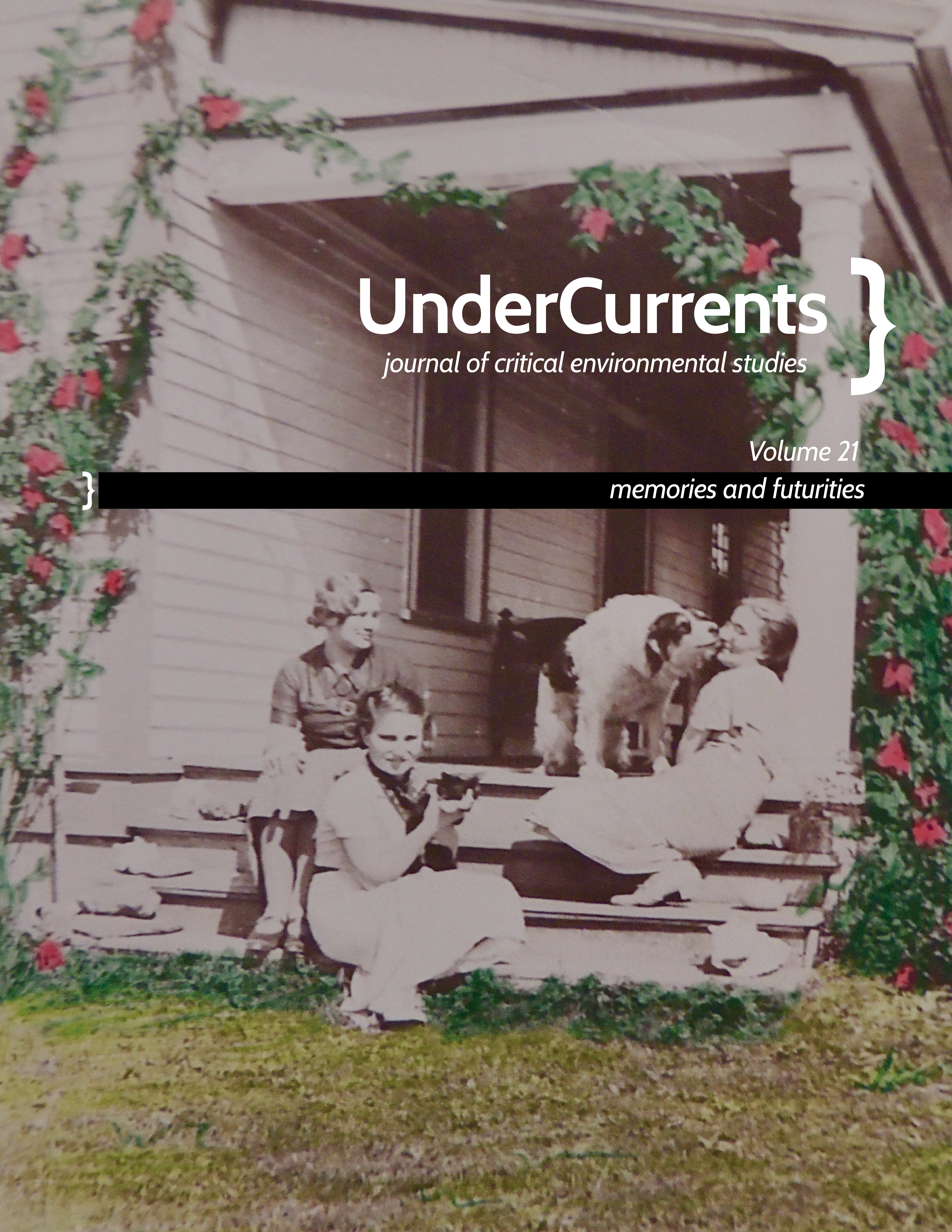Chronotopographies
Chronotopes and the Crafting of Fictions
DOI:
https://doi.org/10.25071/2292-4736/40286Keywords:
Chronotopography, chronotope, fictionAbstract
In this paper, I delineate the workings of my concept of chronotopography. Starting from Bakhtin’s concept of chronotope—historico-poetic forms combining time, space and subjectivity—I define chronotopographical fiction as exploring radically other ways to combine and recombine the three elements of the chronotope. In the first section, I review some of the basic characteristics of the chronotope in Mikhail Bakhtin’s work. In the second section, I bring a definition of fiction in order to develop the concept of chronotopography as a unique kind of fiction that confronts existing chronotopes. I conclude that emphasizing the chronotopographical aspects of fiction can show us how to identify and compose new fictions that challenge hegemonic conceptions of time, space and subjectivity.
References
Bakhtin, Mikhail. “Forms of Time and of the Chronotope in the Novel.” The Dialogic Imagination: Four Essays by M. M. Bakhtin, edited by Michael Holquist. U of Texas P, 1981, pp. 84–258.
Burton, James. The Philosophy of Science Fiction: Henri Bergson and the Fabulations of Philip K. Dick. Bloomsbury, 2015.
Carson, Rachel. Silent Spring. Houghton Mifflin, 1962.
Fisher, Mark. Capitalist Realism: Is There No Alternative? O Books, 2009.
Foucault, Michel. “Different Spaces.” Essential Works of Foucault, 1954–1984: Aesthetics, Method, and Epistemology, edited by James D. Faubion. The New Press, 1998, pp. 175–185.
Foucault, Michel. Surveiller et Punir: Naissance de la Prison. Paris, Gallimard, 1975.
Fukuyama, Francis. The End of History and the Last Man. Free Press, 1992.
Haraway, Donna. Staying with the Trouble: Making Kin in the Chthulucene. Duke UP, 2016. DOI: https://doi.org/10.2307/j.ctv11cw25q
Hache, Émilie. “The Futures Men don’t see.” Gestes spéculatifs: Actes du colloque de Cerisy, edited by Didier Debaise and Isabelle Stengers. Dijon, Les Presses du Réel, 2015.
Howell, Philip, and David Beckingham. "Time-Geography, Gentlemen, Please: Chronotopes of Publand in Patrick Hamilton's London Trilogy." Social and Cultural Geography, vol. 16, no. 8, 2015, pp. 931–949. DOI: https://doi.org/10.1080/14649365.2015.1040059
Koselleck, Reinhart. Estratos do tempo: estudos sobre história. Rio de Janeiro, Contraponto/PUCRIO, 2014.
Latour, Bruno. Nous n’avons jamais été modernes: essai d’anthropologie symétrique. Paris, La Découverte, 1991.
Le Guin, Ursula K. The Left Hand of Darkness. Ace Books, 1969.
Merchant, Carolyn. Autonomous Nature: Problems of Prediction and Control from Ancient Times to the Scientific Revolution. Routledge, 2016. DOI: https://doi.org/10.4324/9781315680002
Roderick, Ian. Views from Nowhere: A Chronotopography of the Victorian Gazetteer. 1992. Carleton University, MA thesis.
Stengers, Isabelle. Au temps des catastrophes: resister à la barbarie qui vient. Paris, La Découverte, 2009.
Stengers, Isabelle. Cosmopolitiques: la guerre des sciences. Paris, La Découverte, 1997. DOI: https://doi.org/10.1016/S1240-1307(97)81552-X
Stengers, Isabelle. Power and Invention: Situating Science. U of Minnesota P, 1997.
Stengers, Isabelle, and Philipe Pignarre. La sorcellerie capitaliste: pratiques de désenvoûtement. Paris, La Découverte, 2005.
Szendy, Peter. L’apocalypse cinéma: 2012 et autres fins du monde. Nantes, Capricci, 2012. DOI: https://doi.org/10.14375/NP.9782918040927
Tsing, Anna. The Mushroom at the End of the World: On the Possibility of Life in Capitalist Ruins. Princeton UP, 2015. DOI: https://doi.org/10.1515/9781400873548
Ullrich, J. K. “Climate Fiction: Can Books Save the Planet?” The Atlantic, 14 Aug. 2015, http://www.theatlantic.com/entertainment/archive/2015/08/climate-fiction-margaret-atwood-literature/400112/. Accessed 14 Sept. 2016.
Viveiros de Castro, Eduardo. Cannibal Metaphysics: For a Post-Structural Anthropology. Edited and translated by Peter Skafish, Univocal, 2014.
Downloads
Published
How to Cite
Issue
Section
License
Copyright (c) 2022 UnderCurrents: Journal of Critical Environmental Studies

This work is licensed under a Creative Commons Attribution 4.0 International License.
Creators retain copyright for all writings and artwork published in UnderCurrents. New material published as of Volume 21 (2022) is available under a Creative Commons Attribution 4.0 International License (CC-BY 4.0).


